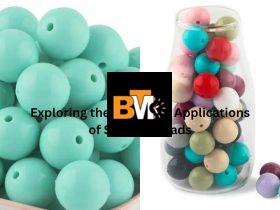Introduction:
In today’s rapidly evolving consumer market, personalization has become a key driver in shaping purchasing decisions. More than ever, people want products that align with their individual preferences, needs, and lifestyles. The demand for customizable consumer goods has increased as businesses recognize the importance of offering unique and tailored options. Whether it is personalized skincare, custom-built technology, or flavor-enhanced food and beverage products, consumers are seeking control over their purchases.
This shift toward customization is fueled by advancements in technology, data analytics, and changing consumer expectations. Brands are leveraging artificial intelligence, 3D printing, and direct-to-consumer models to create highly personalized shopping experiences. By giving customers the power to tailor their products, businesses can foster stronger connections and increase brand loyalty. As customization continues to shape industries, it is essential to understand its impact and the factors driving this trend.
The growing demand for personalized shopping experiences:
Consumers no longer want one-size-fits-all solutions; they seek products and services that cater to their unique preferences. This growing demand for personalization has changed how businesses operate, from product development to marketing strategies. Companies that offer tailored experiences stand out in competitive markets and attract a more engaged customer base.
Retailers and e-commerce platforms are now using data-driven insights to enhance customer experiences. AI-powered recommendation systems, virtual try-on features, and interactive design tools allow shoppers to modify products to their liking. As personalization becomes a standard expectation, businesses must invest in innovative solutions to meet consumer demands.
Technology is enabling mass customization in consumer goods:
Advancements in technology have made mass customization more accessible and efficient. From AI-driven design tools to automated production systems, technology plays a crucial role in delivering personalized products at scale.
- How technology is shaping customizable consumer goods:
- 3D printing allows for on-demand production of custom designs.
- AI-driven analytics offer personalized recommendations based on user behavior.
- Augmented reality (AR) enhances online shopping with virtual previews.
- Automated production lines reduce costs while offering tailored options.
Brands that integrate technology into their customization processes can streamline operations while maintaining affordability and product quality. The ability to mass-produce personalized goods has redefined the consumer experience across various industries.
Customization in the beauty and personal care industry is transforming consumer preferences:
The beauty and personal care industry has been one of the most successful adopters of customization. Skincare brands now offer personalized formulas based on individual skin types, while cosmetic companies allow customers to create their own shades and textures. This level of personalization has reshaped consumer expectations for beauty products.
Beyond formulation, packaging and branding have also become customizable. Many companies now allow customers to engrave their names on beauty products or choose eco-friendly packaging options. As more consumers prioritize individuality and sustainability, beauty brands must continue innovating to stay competitive.
How food and beverage industries are embracing customization:
The food and beverage sector has also seen a significant rise in personalized options. Whether it is custom meal kits, dietary-specific snacks, or tailored coffee blends, consumers now expect food to match their nutritional needs and flavor preferences.
- Examples of customization in food and beverages:
- Meal delivery services offering customized dietary plans.
- Coffee brands allowing customers to create their own blends.
- Personalized protein powders and supplement formulations.
- Customizable soft drinks with different flavors and sugar levels.
Even the vaping industry has followed this trend, offering customizable e-liquid flavors and nicotine strengths. For example, brands like vape juice allow users to select different flavor profiles, ensuring a personalized experience that suits their tastes. This flexibility appeals to consumers looking for variety and control over their choices.
The role of sustainability in the rise of personalized products:
Sustainability has become a major concern for consumers, influencing their purchasing decisions. Customizable goods contribute to sustainability by reducing waste and promoting responsible consumption. Personalized products are often made-to-order, minimizing excess inventory and unnecessary production.
Many brands are now focusing on sustainable customization by offering refillable packaging, biodegradable materials, and ethically sourced ingredients. Consumers appreciate businesses that provide eco-friendly alternatives, further solidifying the connection between customization and environmental responsibility.
Why consumers value exclusive and limited edition customizable goods:
Exclusivity is a driving factor behind the appeal of customizable products. Many shoppers seek unique and limited-edition items that reflect their personal identity. Whether it is a signature scent, a custom sneaker design, or a one-of-a-kind fashion piece, consumers are willing to invest in products that offer a sense of individuality.
Brands leverage this demand by offering time-sensitive customization options, such as exclusive product drops or collaborative designs. The combination of personalization and exclusivity not only enhances customer engagement but also strengthens brand loyalty.
The impact of direct to consumer models on product customization:
The direct-to-consumer (DTC) business model has allowed brands to connect with customers more effectively, eliminating middlemen and offering highly personalized experiences. DTC brands can use customer data to create tailored products, improving both quality and customer satisfaction.
- How DTC models enhance customization:
- Enables direct feedback loops for improving product personalization.
- Reduces costs associated with traditional retail distribution.
- Provides flexibility in product variations and limited releases.
- Builds strong brand-consumer relationships through direct interaction.
Many DTC brands have built their success around customization, offering consumers full control over their purchases. This approach has revolutionized industries such as apparel, beauty, and wellness, setting new standards for product innovation.
The future of customizable consumer goods and emerging trends:
As technology continues to evolve, the future of customizable goods will be shaped by even more advanced innovations. AI-driven design, blockchain-based supply chains, and predictive customization will redefine how businesses cater to consumer needs.
- Emerging trends in customizable goods:
- AI-driven predictive personalization for real-time product recommendations.
- Blockchain technology ensuring transparency in customized product sourcing.
- Sustainable, zero-waste production models for personalized goods.
- Augmented reality shopping experiences for in-depth customization.
With these advancements, businesses will be able to offer hyper-personalized products at an even larger scale, further enhancing consumer satisfaction and engagement.
Conclusion:
The shift toward customizable consumer goods reflects a growing demand for individuality, sustainability, and enhanced shopping experiences. From fashion and beauty to food and technology, industries are evolving to offer tailored products that meet diverse consumer needs. Companies that embrace customization can differentiate themselves in competitive markets, build brand loyalty, and enhance customer satisfaction.
As technology and sustainability continue to drive this trend, the future of consumer goods will be increasingly focused on personalization. Businesses that invest in innovative customization strategies will stay ahead of the curve, meeting the expectations of modern consumers who seek control, convenience, and exclusivity in their purchasing decisions.







Leave a Reply